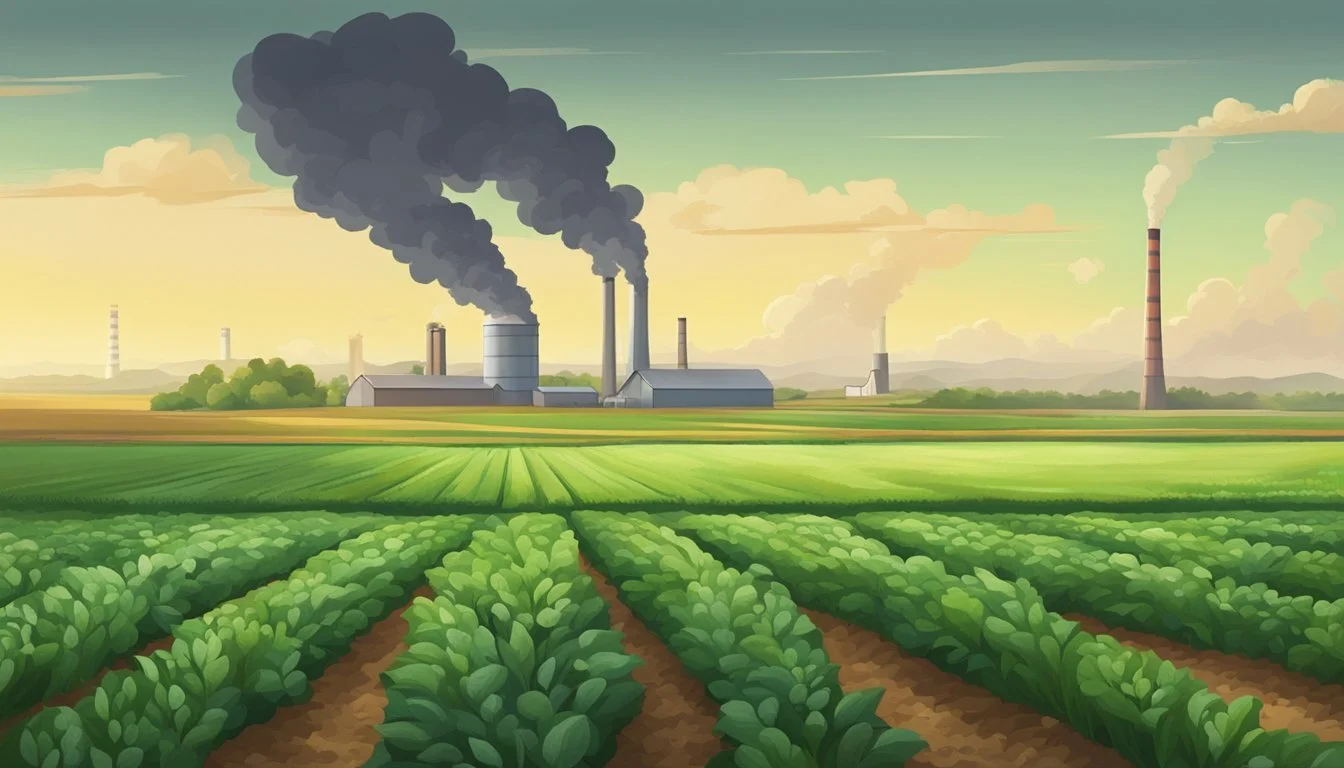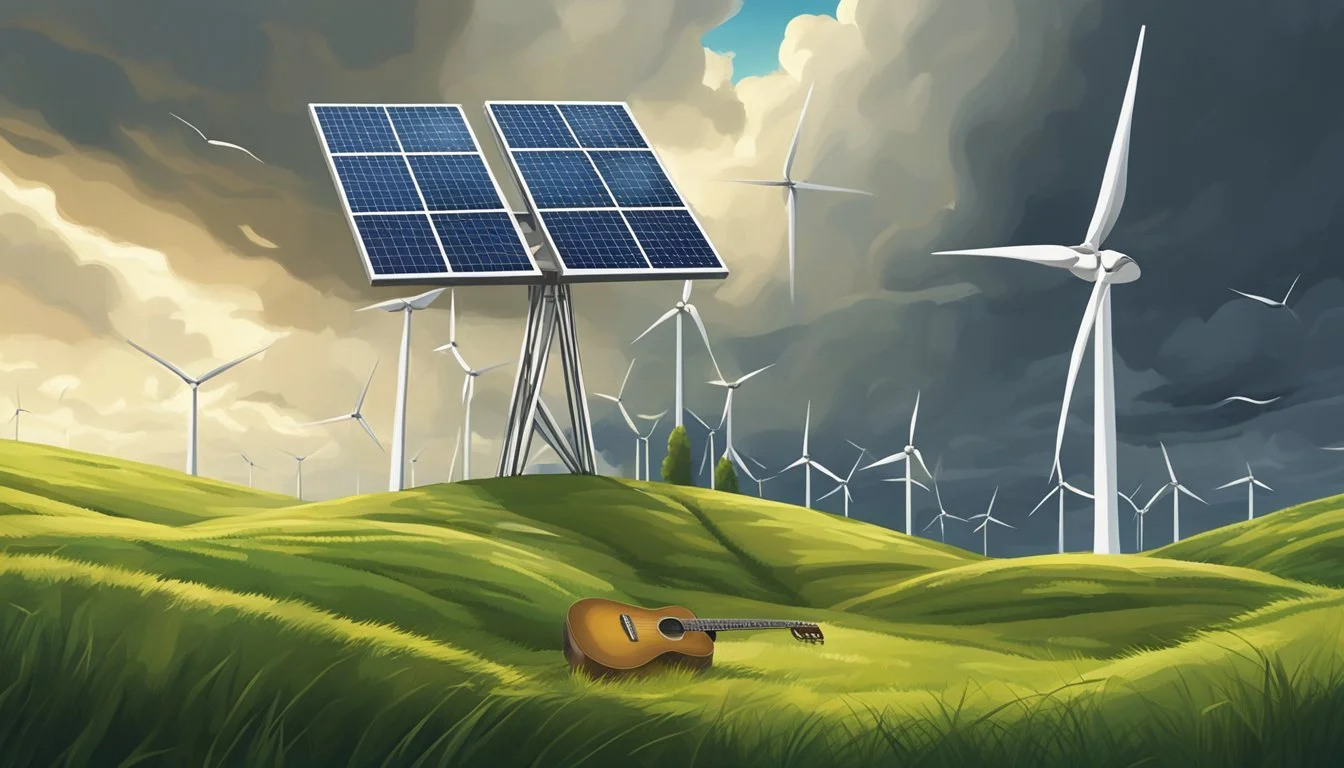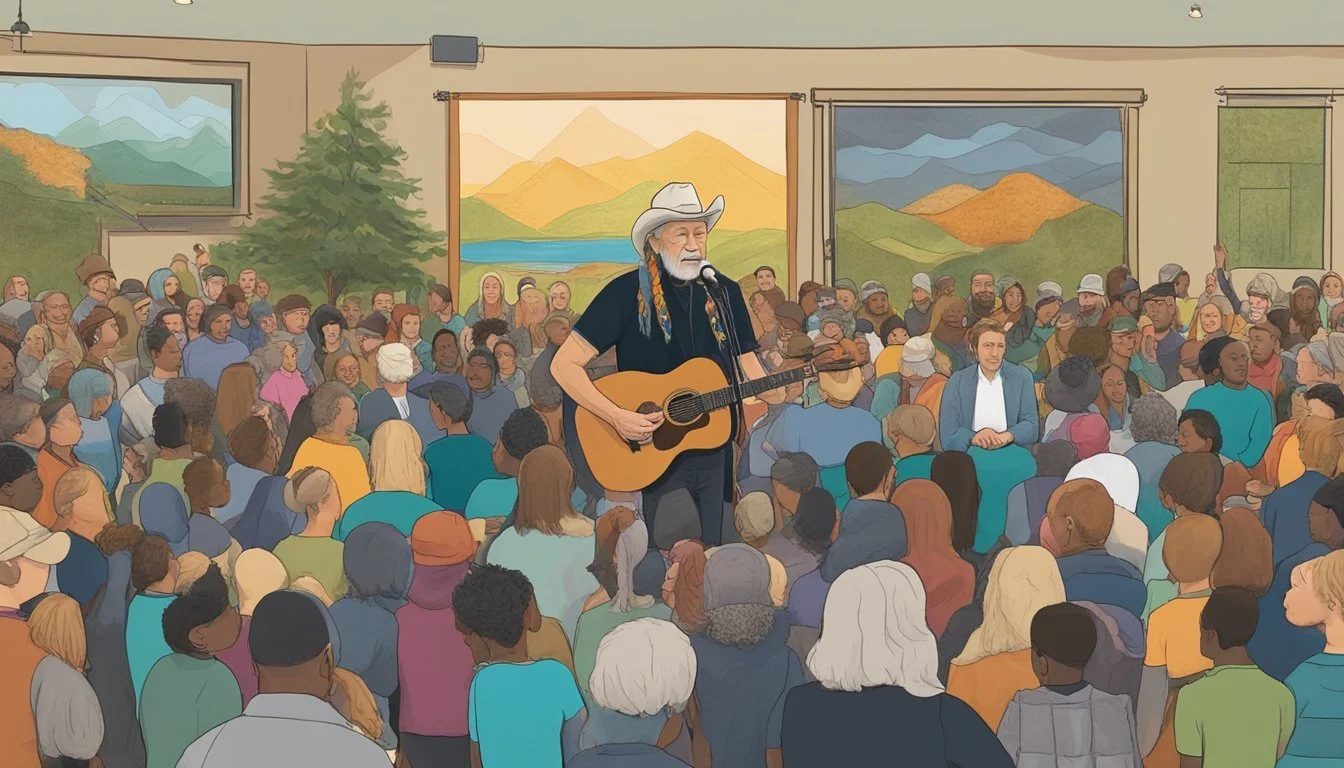Willie Nelson Takes a Stand: The Country Legend's Fight Against Climate Change!
Willie Nelson, the iconic country music legend, has long been an advocate for environmental causes and sustainable farming practices. In recent years, he has turned his attention to one of the most pressing issues of our time: climate change.
Nelson's commitment to addressing climate change is evident in his work with Farm Aid, an organization he co-founded in 1985 to support family farmers. Through Farm Aid, he has highlighted the critical role farmers play in soil health and climate mitigation. Nelson recognizes that sustainable agricultural practices can help reduce greenhouse gas emissions and improve the resilience of our food systems.
The country star's influence extends beyond his music, as he uses his platform to raise awareness about climate change and its impact on agriculture. Nelson has participated in events like the Farmers for Climate Action: Rally for Resilience, where he performed and spoke about the urgent need for climate action. His involvement in these initiatives demonstrates his dedication to combining his musical talents with environmental activism.
Willie Nelson's Advocacy for Climate Change
Willie Nelson, the iconic country music star, has become a vocal advocate for addressing climate change. His efforts focus particularly on the role of family farmers and sustainable agriculture in combating this global issue.
Nelson utilizes his platform as a renowned musician to raise awareness about climate change's impacts on rural communities. He emphasizes the critical role farmers play in stewarding soil, water, and the climate.
Through Farm Aid, an organization Nelson co-founded, he highlights the connection between sustainable farming practices and climate change mitigation. Farm Aid's initiatives promote soil health as a key factor in reducing greenhouse gas emissions.
Nelson's advocacy extends beyond raising awareness. He supports research and education on sustainable agriculture through the Willie Nelson Endowment for Uplifting Rural Communities at the University of Texas at Austin.
This endowment funds studies on sustainable agriculture, resilient energy, and natural disaster recovery - all crucial aspects of climate change adaptation and mitigation in rural areas.
By linking climate action to the wellbeing of family farmers and rural communities, Nelson brings a unique perspective to the climate change conversation. His efforts help bridge the gap between environmental concerns and agricultural interests.
The Connection Between Farm Aid and Climate Action
Farm Aid has evolved from supporting family farmers to addressing broader agricultural and environmental issues. The organization now plays a crucial role in raising awareness about climate change's impact on farming and promoting sustainable practices.
History of Farm Aid
Farm Aid began in 1985 as a benefit concert organized by Willie Nelson, John Mellencamp, and Neil Young. The event aimed to raise funds for struggling family farmers during the U.S. farm crisis. Over time, Farm Aid expanded its mission to address various challenges facing rural communities.
The organization has raised nearly $80 million since its inception. These funds support programs that help farmers thrive and promote sustainable agriculture. Farm Aid's focus has shifted to include environmental concerns, recognizing the interconnection between farming practices and climate change.
Farm Aid's Role in Climate Awareness
Farm Aid has become a platform for discussing climate change's effects on agriculture. The organization highlights how extreme weather events, changing growing seasons, and unpredictable rainfall patterns impact farmers' livelihoods.
Through its annual concerts and outreach programs, Farm Aid educates the public about climate-resilient farming practices. The organization promotes regenerative agriculture, which can help sequester carbon and improve soil health.
Farm Aid also supports farmers implementing sustainable methods on their farms. This includes advocating for policies that incentivize climate-friendly farming practices and help farmers adapt to changing environmental conditions.
Contributions of Artists to Farm Aid
Musicians play a vital role in Farm Aid's success and its climate action efforts. Willie Nelson, as the organization's president and co-founder, continues to be a driving force behind its mission.
John Mellencamp and Neil Young, along with Dave Matthews who joined later, use their platforms to raise awareness about farming issues and climate change. These artists perform at the annual Farm Aid concert, drawing attention to the challenges faced by family farmers.
Their involvement extends beyond performances. The musicians participate in rallies, speak at events, and advocate for policy changes. Their star power helps amplify Farm Aid's message, reaching a broader audience and inspiring action on climate change and sustainable agriculture.
Agriculture's Impact on Climate
Agricultural practices significantly influence global climate patterns through greenhouse gas emissions and land use changes. Farming methods and food production systems play a crucial role in both contributing to and potentially mitigating climate change.
Sustainable Farming Practices
Sustainable agriculture offers solutions to reduce farming's environmental impact. Conservation tillage minimizes soil disturbance, preserving carbon stores. Crop rotation and cover crops improve soil health and sequester carbon.
Precision agriculture uses technology to optimize resource use. This reduces unnecessary emissions from excess fertilizer and fuel consumption. Agroforestry integrates trees into farmland, enhancing carbon capture.
Improved livestock management can lower methane emissions. This includes better feed quality and manure management systems. Some farms are adopting renewable energy sources like solar and wind power.
Climate Models and Agricultural Predictions
Climate models help forecast agriculture's future challenges and opportunities. These tools project shifts in temperature, precipitation, and extreme weather events.
Models predict changes in crop yields and suitable growing regions. Some areas may see longer growing seasons, while others face increased drought risk. This information guides adaptation strategies for farmers and policymakers.
Researchers use models to assess the effectiveness of mitigation efforts. They can estimate how different farming practices impact greenhouse gas levels. This informs policy decisions and sustainable agriculture initiatives.
Models also help anticipate climate-related threats to food security. They project potential crop failures and price fluctuations. This allows for proactive planning to ensure stable food supplies.
Music and Social Change
Willie Nelson's music has long been intertwined with social and environmental causes. His songs and activism have raised awareness about important issues facing farmers, rural communities, and the planet.
Willie Nelson's Music and Messages
Willie Nelson's lyrics often touch on themes of social justice, environmental stewardship, and rural life. His 1985 song "Living in the Promiseland" advocated for compassion toward immigrants. "Bring It On" from 2018 addressed climate change directly. Nelson's Farm Aid benefit concerts, held annually since 1985, use music to support family farmers and sustainable agriculture.
Nelson's 2022 album "A Beautiful Time" features several environmentally-focused tracks. The song "Energy Follows Thought" encourages mindfulness about humans' impact on the planet. His music continues to evolve with the times while maintaining his signature sound and values.
Collaborations with Other Artists
Nelson frequently collaborates with younger artists to amplify messages about climate action. He recorded "Turn Off the News (Build a Garden)" with Lukas Nelson & Promise of the Real in 2019. The song promotes disconnecting from negative media and reconnecting with nature.
In 2022, Nelson teamed up with Margo Price on "Learning to Lose," which touches on themes of resilience in the face of change. Price, an outspoken climate activist herself, has performed at Farm Aid multiple times. These collaborations help introduce Nelson's long-standing environmental ethic to new audiences.
Impact of Music on Public Perception
Nelson's status as a beloved cultural icon lends credibility to the causes he supports through music. His consistent advocacy has helped keep issues like sustainable farming and renewable energy in the public consciousness for decades.
Farm Aid concerts have raised over $80 million and educated millions of fans about food systems and rural issues. Nelson's biodiesel brand "BioWillie" increased awareness of alternative fuels in the early 2000s. By addressing climate change through relatable storytelling and memorable melodies, Nelson makes complex topics more accessible to mainstream audiences.
Cultural Influence
Willie Nelson's impact extends far beyond music into social and environmental causes. His advocacy has shaped public discourse on climate change and sustainability.
Willie Nelson's Influence Beyond Music
Willie Nelson's cultural influence transcends his musical achievements. His distinctive image and outspoken nature have made him an icon of American counterculture. Nelson's annual Farm Aid concerts, started in 1985, have raised awareness about the challenges faced by family farmers.
His activism has inspired many artists to use their platforms for social causes. Nelson's support for environmental issues has encouraged fans to consider their impact on the planet. His blend of traditional country values and progressive ideals has bridged generational and political divides.
Promotion of Climate Issues Through Various Platforms
Willie Nelson actively promotes climate awareness through multiple channels. He co-founded BioWillie, a biodiesel fuel company, to reduce dependence on fossil fuels. Nelson's 2007 book "On the Clean Road Again" advocates for biodiesel use and sustainable farming practices.
He uses his music festivals as platforms to educate attendees about environmental issues. Nelson's tour buses run on biodiesel, setting an example for sustainable transportation in the entertainment industry. His farm in Texas serves as a model for sustainable agriculture, showcasing solar power and water conservation techniques.
Nelson frequently speaks about climate change in interviews and public appearances, leveraging his celebrity status to reach wide audiences. His consistent messaging on environmental topics has helped keep climate issues in the public eye for decades.
Unique Approaches to Climate Messaging
Willie Nelson's climate change initiatives incorporate innovative strategies to engage and educate audiences. These approaches blend music, community, and sustainability to create memorable experiences that inspire action on environmental issues.
Creative Climate-Themed Events
Willie Nelson's Farm Aid concerts serve as a platform for climate messaging. These events feature eco-friendly practices like biodegradable utensils and solar-powered stages. Local food vendors showcase sustainable agriculture.
Artists perform climate-themed songs and share environmental facts between sets. Interactive booths allow attendees to calculate their carbon footprint and learn about renewable energy.
The events often include tree-planting ceremonies, symbolizing hope for a greener future. Volunteers distribute reusable water bottles and provide recycling education.
Homegrown Village and Farmyard Stage
The Homegrown Village at Farm Aid events is a hub of climate innovation. Local farmers demonstrate sustainable techniques like composting and water conservation. Visitors can sample organic produce and learn about farm-to-table practices.
The Farmyard Stage hosts climate scientists and agricultural experts. They give short, engaging talks on topics like soil health and crop resilience. Interactive workshops teach attendees how to start backyard gardens and reduce food waste.
Children's activities include eco-art projects and nature-inspired games. Electric tractors and solar-powered farm equipment are on display, showcasing clean energy solutions for agriculture.
Outreach and Education
Willie Nelson's advocacy extends to raising awareness and educating the public about climate change. His efforts focus on engaging diverse audiences and supporting educational initiatives to empower people with knowledge and actionable steps.
Engaging the Public on Climate Issues
Willie Nelson uses his platform as a musician and cultural icon to reach wide audiences on climate issues. He incorporates environmental messages into his music and concerts, connecting with fans on an emotional level. Nelson partners with environmental organizations to host awareness events and rallies. These gatherings combine entertainment with educational components about climate impacts and solutions.
Nelson also leverages social media to share climate information and inspire action among his followers. His posts highlight sustainable farming practices, renewable energy adoption, and ways individuals can reduce their carbon footprint.
Educational Initiatives and Resources
The Willie Nelson Endowment for Uplifting Rural Communities supports research and student fellowships at the LBJ School of Public Affairs. This program focuses on sustainable agriculture, hunger elimination, resilient energy, water conservation, and disaster recovery.
Nelson collaborates with schools to develop climate curriculum for K-12 students. These materials emphasize hands-on learning through activities like school gardens and energy audits. He sponsors scholarships for students pursuing environmental studies and sustainable agriculture degrees.
The Willie Nelson Climate Education Center provides free online resources for teachers and students. These include lesson plans, interactive simulations, and video series explaining climate science basics.
Miscellaneous Works and Appearances
Willie Nelson's influence extends beyond music into climate change advocacy through various media appearances and non-musical projects. His involvement ranges from televised events to literary works focused on environmental issues.
Appearances in Climate-Related Programming
Willie Nelson has lent his voice and presence to multiple climate-focused television programs. He performed at the "Rally for Resilience" event in Washington, DC on March 7, 2023. Nelson addressed the crowd and sang "Heartland" alongside Micah Nelson and Mickey Raphael, demonstrating his commitment to climate action.
The legendary singer also participated in benefit concerts supporting environmental causes. His appearances often blend music with messages about sustainability and climate awareness, reaching diverse audiences.
Features in Non-Music Climate Projects
Nelson's climate activism includes ventures in literature and business. In 2007, he authored "On the Clean Road Again: Biodiesel and the Future of the Family Farm," advocating for biodiesel use and reduced emissions.
His entrepreneurial spirit led to partnerships in biodiesel production. Nelson and his wife Annie collaborated with Bob and Kelley King to establish two biodiesel plants in Salem, Oregon and Carl's Corner, Texas in 2004.
These projects showcase Nelson's hands-on approach to promoting alternative energy sources and supporting rural communities in the face of climate challenges.







